|
|
| |
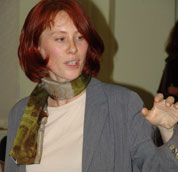 |
| |
| Jenny Chambers, Director of the MiraMed National Training Center |
|
Each year, 15-20,000 orphans "graduate" from Russian orphanages and internats. These "emancipated" orphans have few skills to cope with life outside an institution. More than half fall into lives of crime, prostitution, and drugs or join the more than 1 million homeless teenagers living on the street. Ten percent commit suicide.
Our response to this crisis was to create Centers for Social Adaptation to teach orphans in their last two years of orphanage life (15-17 years) and emancipated orphans (17-23), the basic independent living and life skills they will need to live a successful life. The first Center opened in the fall of 2000 with 4 students in Moscow.
We currently have Centers in Moscow , Uglich and St. Petersburg and sister programs in Ryazan and Perm serving almost 1200 children and young adults. The two year program is taught by Russian psychologists and social workers and includes curriculum-based education as well as visits, excursions and practical "real life work". Included in the program is a strong focus on health, safety and legal rights.
| |
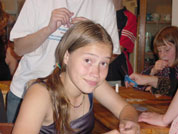 |
| |
| Teenagers participating in Center activities. |
|
Each Center is staffed with trained psychologists and social workers. The staff conducts the program for 15-17 year-olds in their orphanages as well as at the Center. In the late afternoon and evening, emancipated orphans, 17-23 visit the Center for their program.
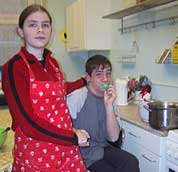 |
| Orphans learn a series of "living skills" in the Adaptation Center, such as learning how to cook. |
|
The Center program consists of educational "modules" to teach specific life skills (ranging from "what is a healthy relationship" to "buying, storing and cooking food") as well as group and individual counseling and psychological support. Students also learn how to access legal, health and educational facilities.
Each Center has computers, where students learn both basic use and preventive maintenance. Some Centers offer English language instruction and have small kitchens where students can cook and share a meal, relax in a social setting and even watch a video.
Students also have the opportunity to serve on a Center Advisory Board, which meets with staff to evaluate program content. Each Center also publishes a newspaper that is written, designed and published by students and some are hired on a rotating basis as Center Interns to help support the professional staff and learn basic work skills.
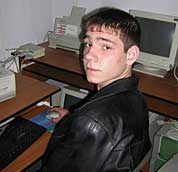 |
| Students are taught basic computer skills in the Center. |
|
Each student is assigned to a professional staff team, which is required to keep case files and conduct periodic evaluations. Student self-assessments are also done to ensure that what is taught is being learned. Each student is also "tracked" for one year after "graduation" to determine how he or she is coping. "Home visits" by staff to these former students are made on an as-needed basis as well.
Throughout the year, in-service training is provided for professional staff and several times each year, staff from each Center meet together to share information and experience.
Based on our first full year of research, more than 90% of our students have told us that they feel "better prepared" and "more independent" to live successful lives as a result of being at the Center. We believe our Centers are making an enormous difference in the lives of these young adults.
After moving three times in the past two years in our constant struggle to find a permanent home for our curriculum-based program serving orphans 15-23 years old, we finally succeeded and are now housed at the Blago Center, a restored three-story former hospital in a gated compound about 45 minutes from the city center.
It is a city-owned building, which is in good condition though not yet completely remodeled, with a great deal of potential. For the first time in three years, we have working phones, new offices, lots of space to grow and a home for the next decade or longer. We hope to be able to bring in other Russian organizations who can provide additional programs and services to our students. The Center has many unique features that we would like to develop further. One of them is a large kitchen that could be used for communal meals and cooking/food preparation classes. We received a donation of a stove and a refrigerator and have begun weekly cooking classes. This fall we'll be setting up a larger computer lab and raising funds to finish a sports hall. Our classrooms, library and counseling spaces are nearly finished and being fully utilized.
This year also marked the second full year of our National Training Program, which is funded by the GE Foundation and Geneva Global to help share our experience with orphanage and social worker/psychology staff at orphanages all over Russia . By the end of 2006 we will have trained more than 50 orphanages how to start their own social adaptation programs in their institutions. Our growing reputation and expertise will enable us to reach more than 1,200 orphans and emancipated orphans this year.
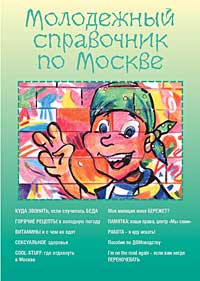 |
| "Moscow's Survival Guide for Youth" printed by MiraMed Institute. |
|
Our newly revised curriculum now includes more than 70 different workbooks for our two year course dealing with everything from orphans rights to AIDS prevention.
We have also published a 100 plus page, pocket-sized "Moscow Guide for Youth", funded by the World Bank with support from Bristol-Myers Squibb and World Childhood Foundation. It has been so successful that UNICEF has funded us to create a St. Petersburg Survival Guide for Youth that will be published in 2006. Both of these Guides are “first-of-their-kind” compendiums of how to cope in Moscow and St. Petersburg if you are an emancipated orphan. Each is packed with practical information such as emergency phone numbers, places to get help with education, legal and human rights issues, how to pay bills, avoid difficulties with police, medical information, nutrition, and more. Printed in full color with a laminated cover for extra durability, this handy little guidebook features wonderful water color illustrations and will be a valuable daily resource for the kids who need it most!
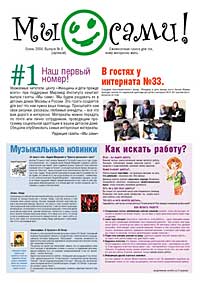 |
Russia's first newspaper
for orphans - "Mi Sami" is delivered to more than 50 orphanages each month. |
|
Among many other milestones for the program this year was a grant to publish Russia 's first newspaper for orphans, “Mi Sami” (We can do it), which is printed in full color and is delivered to more than 50 orphanages in Moscow each month. Our goal is to have 50% of more of the content written and designed by orphans. The project was supported by the United Way, Moscow.
Finally, to address with the enormous HIV/AIDS crisis in Russia , we have been asked to partner with the City of Moscow to co-develop and pilot a new, innovative integrated HIV/AIDS prevention education curriculum in 2006. This is a distinct honor and privilege as well as an enormous responsibility. We will post updates on this website as this crucial program develops.
In August 2006, the Moscow Department of Education recommended that all Moscow orphanages should conduct the We Can Do It! social competency training program. Specialists from 60 orphanages enrolled for professional training at the MiraMed National Training Center in September. The MiraMed National Training Center is run in partnership with Women and Children First. A wide professional training network has now been created spanning Moscow, St. Petersburg, and three other regions of the Russian Federation. This network of dedicated creative professionals is helping to promote best practices, bringing essential life skills training to over 1000 orphaned teens.
Following the success of the MiraMed We Can Do It! program for teens aged 14-16 years, we received requests from institutions and government agencies to develop programs for younger age groups. This work has already begun, with a comprehensive review of existing programs for younger children. Funding support is provided by World Childhood Foundation and Oriflame, Sweden.
CLICK HERE FOR UP TO DATE INFORMATION ON MIRAMED'S PROGRAMS IN RUSSIA ON THE "MI SAMI!" (WE CAN DO IT!) RUSSIAN WEBSITE
Silence is not golden when it stifles a child’s development and defines his or her relationship with adults. Vulnerable children living in orphanages or temporary shelters oftentimes have few experiences where they were listened to by adults. Life in children’s homes and shelters is highly regimented. Children have few opportunities to express their opinion, to make choices, or to be creative.
These are all important elements of growing up for every child. Adults responsible for protecting at-risk children often forget that children need to feel understood as well as to receive care. The Listening to Children project aims to help children and adults communicate better and raise awareness of the issues that are important to vulnerable children. Using creative interactive media such as a newspaper for children, talk shows, film making, and a film discussion club, children gain confidence and skills to express their ideas and feelings on those issues which are most important to them.
Each month, 3000 orphans receive the “We Can Do It!” children’s newspaper. Many of the children and their caretakers have become involved in writing materials for the newspaper. “Should I tell my classmates I am an orphan?” was one of many topics covered by the newspaper and discussed in one of three talk shows held by MiraMed’s trainers in orphanages. Through the spring months, children and specialists in orphanages helped select films for “Film, Film, Film,” a guide to using films for discussions with teens. The first edition was printed in August. Psychologists and caretakers from 30 orphanages attended trainings at the National Training Center to learn communication skills for their everyday work with children.
Plans for 2007 include a Listening to Children Conference to which we will invite politicians and policy-makers to join our dialogue with children, and where we will create a film showing life in orphanages through children’s eyes.
For most of us, growing up is a process of gradually taking over responsibility for our own lives. For orphanage graduates, the transition is an abrupt one and often leads to crisis. From having very little control of their lives, with few opportunities to make decisions and be responsible,
young people suddenly have total freedom yet little experience of how to cope with this freedom.
The Step by Step program focuses on helping young people to develop supportive networks and on training community center social workers, vocational school teachers, and orphanage staff on how they can best help orphanage graduates gain adult independence. This project, co-funded by the European Commission, places a strong focus on interdepartmental cooperation to create a unified system of support and training for orphans through the transition period. The project began when MiraMed partner Women and Children First signed a three-way contract with the Department of Education and the Department of Social Protection of Moscow to develop support services for orphanage graduates.
Throughout the year, 30 social workers from 13 Moscow community centers attended regular training seminars at the MiraMed National Training Center. The trainings covered a wide range of topics including the psychological effects of institutionalization, personal plans, needs assessments, and communication skills while working with young people, and legal issues. In September, as a result of this training, 13 Moscow community centers organized the first-ever Moscow “Open Doors Day” for young people from orphanages to meet their future social workers. To test new working methods developed by Women and Children First, 6 pilot sites have been established at community centers, vocational schools, and orphanages for monitoring and evaluation.
MiraMed’s success in raising awareness of the needs of orphanage graduates has led to funding from the city of Moscow to support programs for orphanage graduates as well as new forms of cooperation between community centers and orphanages.
CLICK HERE FOR UP TO DATE INFORMATION ON MIRAMED'S PROGRAMS IN RUSSIA ON THE "MI SAMI!" (WE CAN DO IT!) RUSSIAN WEBSITE <
|
|
